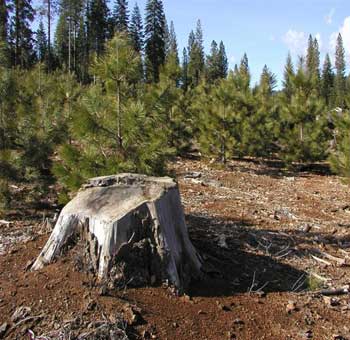 |
| Previous Image | Next Image |
| Description: While the logging industry provides, what some would say, is a necessary service to the public, they also produce devastating effects on forest ecology and plant ecology. They provide obvious destruction of trees but also destroy plants, animals and other wildlife. Demand on the logging industry’s service is high, partly because of the demand for paper products. If humans cut down on their consumption of wood based products, the logging industry would cut down on the devastation they cause to forest ecology and plant ecology. There are solutions to preventing future devastation to forest ecology. Humans could cut down on their consumption of paper products and could recycle any that they use. We could stop using wood as a source of fuel, especially when there are so many equally effective and renewable alternatives. While it seems like a small step, we could use fake trees for Christmas or better yet, use trees that can be replanted after the holiday season is over. While many Christmas trees are cut from tree farms, rather than forests, there is still a direct effect on the environment. While these solutions seem obvious, humans often take such products for granted. We do not often think of the effect our hardwood floors have on the forest ecology in Brazil. We do not think of the environmental cost of the paper we use at work. Plant ecology is also effected by logging. Trees provide shade that many plants need to flourish. There are also plants that grow on trees and when the trees are logged, those plants come down to. The largest devastation to plant ecology caused by loggers would be the destruction caused by loggers machines. Loggers use machines that are large, heavy and bulky. Those machines destroy anything in their path including plants, animals, birds and organisms that we cannot see with the human eye. The ripple effect on the forest ecology may not be evident right away, but in the long run, when habits are lost, food sources for many organisms go with them. The wildlife that stays in an area that has been logged, are likely to lose habitat, food source and encounter some level of pollution cause by the loggers machines. Realistically, however, much of the wildlife that once flourished, will leave the logged area, forcing crowding in another part of the forest. There are many things that effect forest ecology and plant ecology. If the logging industry wants to continue to thrive, they should also be concerned about forest ecology. If forest destruction continues at its current rate, there will eventually be no forest left. Trees grow at rates that cannot possibly keep up with the destruction caused by loggers. Some of the trees that loggers cut down, take a hundred years to grow to the height they are destroyed at. There must be a compromise between the loggers and the forest they utilize. If loggers are to reap the benefits that healthy forests produce, then loggers should bear some responsibility for keeping forests healthy. Picture Stats: Views: 16342 Filesize: 27.64kB Height: 340 Width: 350 Source: https://biology-forums.com/index.php?action=gallery;sa=view;id=10483 Keywords: forrest ecology |
